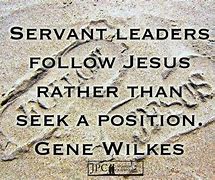The Preacher Identifies As A Servant
The Preacher Identifies As A Servant
We considered the self-identity of the preacher in the past few blogs. We studied the concepts that the preacher should see himself/herself as an under-rower, as a keeper of the mysteries of Christ, and as a slave. In this post we’ll look at one more aspect of our identity as preachers: the preacher identifies as a servant of Christ.
The Identity of the Diakonos
The word that is most often translated as “servant” in the New Testament is diakonos. Transliterated, it is “deacon”. I’m sure you right away are thinking of the office of deacon, but that is only one part of how this word is used in the New Testament. Here’s a definition.
| Definition | |
|
 When I think of this word, I think of a man we hired to be our Director of Operations. As the church had grown, we found we needed greater attention to things like budgeting, finances, building issues, etc. It was a part-time position, and so we wondered who we might get to take on this responsibility. We hired a man who had retired early from his position with a major international corporation. He had run 2 divisions of this corporation, and had been responsible for everything that happened there. What a gift to have someone that talented and experienced!
When I think of this word, I think of a man we hired to be our Director of Operations. As the church had grown, we found we needed greater attention to things like budgeting, finances, building issues, etc. It was a part-time position, and so we wondered who we might get to take on this responsibility. We hired a man who had retired early from his position with a major international corporation. He had run 2 divisions of this corporation, and had been responsible for everything that happened there. What a gift to have someone that talented and experienced!
I saw into his heart one day after a Saturday meeting with elders and staff. He was vacuuming up the carpeting and cleaning countertops in the kitchen. I expressed appreciation for his willingness to do the little things that needed doing. His response has stuck with me. He said, “I choose to be a servant”.
That is someone who identifies as a servant. Someone who is willing to do the lowly things, the things that don’t get much attention.
The Preacher’s Identity As A Servant
There are a variety of kinds of people, fulfilling various roles, who are identified as servants in the New Testament. In  Acts 6 we read about the first official deacons, those appointed to serve tables for widows. Here are some other people who are described as diakonia:
Acts 6 we read about the first official deacons, those appointed to serve tables for widows. Here are some other people who are described as diakonia:
Martha was involved with much “serving” (Lk. 10:40). Judas had a part in the apostolic “ministry” (Acts 1:17). Widows were neglected in the daily “ministration” (Acts 6:1). The apostles were committed to the “ministry” of the word (Acts 6:4). Paul used this term quite often in the Second Corinthian letter (2 Cor. 3:7-9; 4:1; 5:18; 6:3; 8:4; 9:1, 12-13; 11:8).
A woman named Phoebe is mentioned in Romans 16:1, and she is identified as a diaconoi.
16 I commend to you our sister Phoebe, a deacon[a][b] of the church in Cenchreae.
We are not told her specific role in the church, but the people understood that she had a role of service of some kind.
But what I want to focus on is that this word is often used to describe those who preach and lead. Let’s look at some of them:
James and John
 In Matthew 20 we have the report about James and John who saw Jesus as the ticket to greater glory. They apparently convinced their mother to go ask Jesus for special positions in the Kingdom that Jesus was going to establish. When the other ten disciples heard about this, they were, as Matthew reports, “indignant”. So, Jesus corrects their thinking about their identity. Here is how Matthew tells the story.
In Matthew 20 we have the report about James and John who saw Jesus as the ticket to greater glory. They apparently convinced their mother to go ask Jesus for special positions in the Kingdom that Jesus was going to establish. When the other ten disciples heard about this, they were, as Matthew reports, “indignant”. So, Jesus corrects their thinking about their identity. Here is how Matthew tells the story.
25 Jesus called them together and said, “You know that the rulers of the Gentiles lord it over them, and their high officials exercise authority over them. 26 Not so with you. Instead, whoever wants to become great among you must be your servant, 27 and whoever wants to be first must be your slave— 28 just as the Son of Man did not come to be served, but to serve, and to give his life as a ransom for many.”
The identity of a servant is important. It is not about glory, it’s about service. It’s not about being in charge, it’s about ranking ourselves below others. This lesson is so important that Jesus repeats it in Matthew 23:11, when he says, “The greatest among you will be your servant. For those who exalt themselves will be humbled, and those who humble themselves will be exalted.”
Paul, a Preacher Who Identifies As A Servant
Paul describes himself many times as a diaconoi. Here are several of those passages:
Philippians 1:1
1 Paul and Timothy, servants of Christ Jesus, To all God’s holy people in Christ Jesus at Philippi, together with the overseers and deacons[a]:
Colossians 1:23
Jesus, the Model Servant
Of course, Jesus often referred to himself with this word. The ultimate expression is found in John 13, when Jesus  takes a basin and towel and washes his disciples’ feet. This was a humble task, one set aside for servants. Jesus then tells his disciples that this is a model for them to follow.
takes a basin and towel and washes his disciples’ feet. This was a humble task, one set aside for servants. Jesus then tells his disciples that this is a model for them to follow.
The Preacher Identifies as a Servant
The bottom line is this: your identity should include seeing yourself as a servant, someone who who is a servant of the Master and a servant of the Gospel. Look not for glory, but for places and people to serve.



